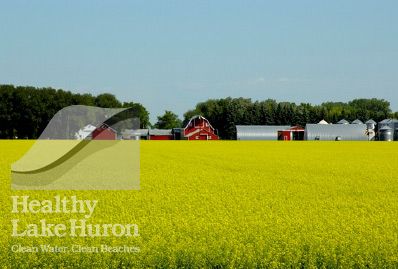Farmers Putting Environmental Farm Plans to Work

The Canada-Ontario Environmental Farm Plan (EFP) is a program that encourages farmers to incorporate the best environmental practices on their farm. Farmers attend two-day workshops to complete a review of their farm operation using the self-assessment workbook. The materials cover 23 different areas such as water wells, soil management and manure storage. The idea for Environmental Farm Plans originated in the farm community and has been used in Ontario since 1993.
Farmers compare their own practices, management techniques and facilities against industry or sector standards. They develop an individualized action plan to address potential environmental concerns and outline timetables to improve environmental conditions on their farms. The completed action plan may then be submitted to a peer review committee. Farmers with peer reviewed action plans are eligible to apply to cost-share programs associated with the EFP to assist in implementing their environmental improvement projects.
Farmers in the counties near Lake Huron have demonstrated a strong commitment to implementing environmental improvement projects. Since 2005, farmers in these counties have been in the top 10 participating in the voluntary education program and in the top 5 counties in terms of number of projects completed. The cost-share programs have helped farmers to implement projects that contribute to improving water and air quality, soil productivity and wildlife habitat and biodiversity. Under the cost-share programs farmers receive thirty to fifty per cent of the funding, and have to assume the balance of the cost.
Common projects farmers have completed in the counties near the Lake Huron shores have a focus on reducing contamination to water sources. Examples include:
- Improved Manure Storage and Handling projects, which provide improved containment systems and increased capacity to store the manure generated on farms.
- Farmyard Runoff Control projects, which divert clean water away from existing farmyards and prevent clean water from becoming contaminated with manure, nutrients, or other potentially hazardous products
- Global Positioning Systems (GPS) and other technologies for precision agriculture projects help farmers make more efficient use of fertilizers, manure and pesticides and improve application rates and placement, reducing the potential for residuals in soils and contamination of surface water that may eventually lead to Lake Huron.
Interested farmers can get involved with the Environmental Farm Plan by attending a workshop delivered by the Ontario Soil and Crop Improvement Association. Ontario Ministry of Agriculture, Food and Rural Affairs staff provides technical expertise to assist farmers in completing their action plan. Funding for the Canada-Ontario Environmental Farm Plan Program is provided through Growing Forward. Growing Forward is a commitment by Canada’s federal, provincial and territorial governments to support the development of a profitable, innovative agri-food sector that is adept at managing risk and responsive to market demands.
By participating in the Environmental Farm Plan Program, farmers see their farms in a new light. The program helps them to both identify environmental problems in their operations and develop plans for improving their farms’ environmental footprint in the future. Farmers in the counties near the Lake Huron shores are strongly committed to managing their land in a healthy and sustainable way for the future.
